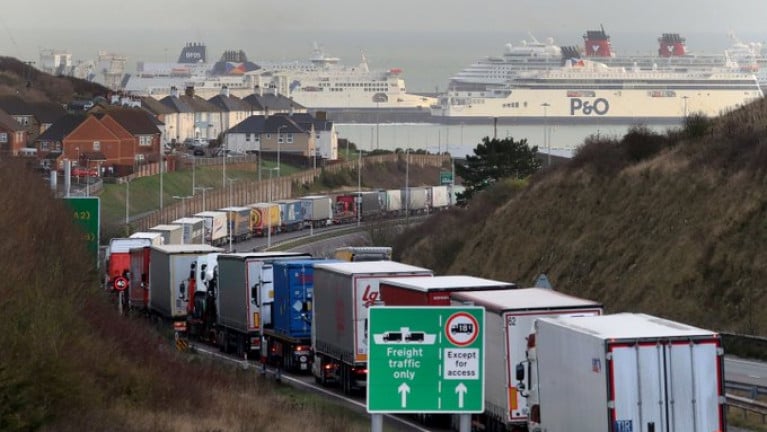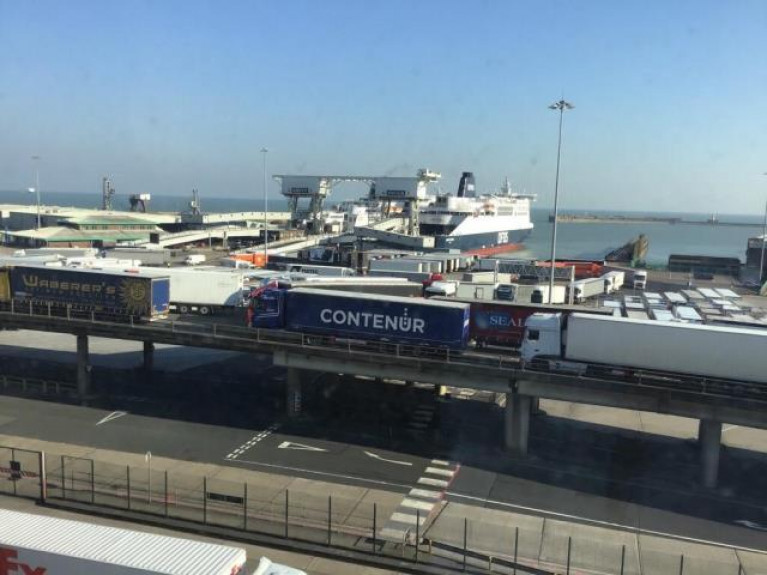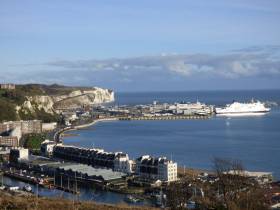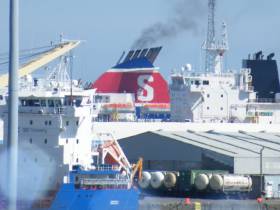Displaying items by tag: Irish Hauliers
Fear of Irish Truckers Losing Out in New Northern Ireland Trade Deal between UK and EU
Trade in products be it ranging from alcohol to steel and more could be displaced directly to Northern Ireland as a result of this week’s Windsor Framework deal reached between the UK and EU, hauliers say.
The Irish Road Haulage Association (founded in 1973, the same year when Ireland and the UK joined the European Economic Community, now the EU), have warned that imports of concrete, timber and even breakfast cereal will be subject to the new deal.
As Independent.ie reports, this would involve stricter rules and higher costs affecting the ports of Dublin and Rosslare (see related story) than Belfast Harbour’s (ferry links to GB) leading to a competitive disadvantage in the Republic.
Eugene Drennan, president of the IRHA said “I just hope this State has Plan B,” when he told an Oireachtas committee that was held yesterday.
“Steel out of Wales should be coming into Rosslare, really. It can now flow freely as a product into Northern Ireland: no tariff, no quota, different Vat regime. Where are we going to shop for steel?”
Monday’s deal of the Windsor framework concludes more than three years of an impasse over the practical workings of the Northern Ireland Protocol to the UK’s 2019 EU exit deal.
More from the newspaper here.
Concerns from Irish Over Delays at UK Ports: ‘If it is Bad Now, it Will be Standstill in January’
Lorries creating long tailbacks at English Channel ferry ports caused by Brexit stockpiling has cost Irish transport firms lost time, heavier overheads and valuable delivery slots, industry insiders said.
Irish lorries have been caught up in road-side “stacking” of vehicles over the past week and logistics businesses fear that traffic gridlock around the Kent ports of Dover and Folkestone and at Calais in France are a foretaste of more severe disruptions once Brexit checks start in January.
Laurence O’Toole, managing director of Co Galway-based O’Toole Transport, said he had to hire extra drivers in the UK for next-day deliveries of seafood from Ireland and Scotland to France because of seven-hour delays at the ports.
This has added costs of up to 40 per cent and reduced productivity at his firm, which transports produce to and from a major seafood distribution hub in Boulogne-sur-Mer in northern France.
Further reading from The Irish Times here.
Irish Hauliers Seek State Help to Bypass Brexit UK ‘Land Bridge’
The Government has been urged by the Irish Road Haulage Association to help set up a fast, direct daily ferry service with continental Europe for lorries to avoid post-Brexit disruption on the UK transit route.
Eugene Drennan, the president of the industry group, has called for Government intervention to secure supply routes with continental Europe by establishing a fast, daily ferry service for lorries, preferably into the French port of Le Havre, supported initially with subsidies.
The association has requested financial support for hauliers using a direct ferry service to cover any higher costs from using the longer, more expensive route and to designate new, faster ferry services as public service obligation (PSO) routes for at least a year.
Mr Drennan said political and logistical challenges thrown up in recent weeks show Ireland’s “extreme vulnerability” to maintaining dependence on the so-called land bridge through the UK to gain access to EU markets.
More on this Irish Times story here.
#ferries - Representives from Irish hauliers the Journal.ie reports, have said that the no-deal Brexit test run at the Port of Dover was too little too late, and wasn’t representative of how bad the tailbacks could be.
On Tuesday, the UK government paid truck drivers to take part in a test of how one element of trade would be handled in the event of a no-deal.
The Port of Dover is Europe’s busiest ferry port, and is the second busiest in England; its cargo terminal handles 300,000 tonnes of freight annually.
A no-deal Brexit would see additional custom and regulatory checks at ports and airports, and possibly along the Irish border unless the Good Friday Agreement supersedes no-deal Brexit arrangements.
But the test was criticised as “a waste of time” and not accurate to how bad the traffic would actually be in the event of a no-deal.
Click here for more including a response from the Irish Freight Association.
#Ports&Shipping - According to the Irish Examiner, a hard Brexit will cost the haulage industry €180m a year, or €40 per hour for every truck, in additional costs, warns the sector’s main representative body.
Irish Road Haulage Association president Verona Murphy told the Oireachtas budgetary oversight committee the sector has “no buffer against Brexit”. Increasing the cost of diesel to bring it in line with petrol will devastate the industry, she said.
More than 47,000 people are employed in freight transport, distribution, and logistics in the Republic, accounting for 2.5% of total national employment.
For more on this story, click here.
#IrishPorts - There are growing calls writes the Irish Examiner for additional funding to be given to ports to improve connectivity to continental Europe following Brexit.
Speaking at a joint Irish Road Haulage Association (IRHA) and Rosslare Europort conference in Wexford, EU Commissioner for Agriculture and Rural Development, Phil Hogan said that Brexit will happen and that its final model was the only question that remained.
He called for a doubling of capacity at Rosslare, and for all ports to examine capacity, adding the forthcoming EU regional policies from 2021 to 2027 represented an opportunity for funding for which the Republic must be ready.
President of the IRHA, Verona Murphy said that because the Europort in Rosslare represents the shortest sea route for goods and passengers to continental Europe, it was ideally positioned to expand and grow in a post-Brexit scenario.
For further reading click here.

































































